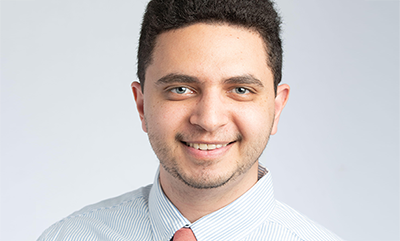‘A Creative Outlet to Process Incarceration’.
 On a Friday afternoon in August, Master of Public Health student Rafik Wahbi handed blank sheets of paper to 25 people housed in a substance use treatment unit at the Suffolk County House of Correction, as the song “I” by rapper Kendrick Lamar filled the room.
On a Friday afternoon in August, Master of Public Health student Rafik Wahbi handed blank sheets of paper to 25 people housed in a substance use treatment unit at the Suffolk County House of Correction, as the song “I” by rapper Kendrick Lamar filled the room.
“We’ve talked about some pretty heavy subjects so far, but this song is more positive, and as you listen to it, I want you to look introspectively,” he told the group.
“You can’t cause conflict or corrupt my spirit
I’m on point like period
I’ve been there and gone before you get near it
Ooh wee, that boy remind me of a young Martin Luther”
“What did the lyrics mean to you?” Wahbi asked, after the song ended.
“It’s saying that you shouldn’t batter yourself, whether through drug addiction or any other type of addiction,” said one member of the class named Daniel. “You have to take care of yourself, but also accept the uncomfortable parts about who you are, and be able to move forward.”
This conversation was part of a hip-hop writing class that Wahbi designed and taught at the House of Correction over the summer. The eight-week project was funded by the Activist Bucks micro-grant program through the Activist Lab at the School of Public Health.
As a musician and avid fan of socially conscious rappers such as Nas, Kendrick Lamar, N.W.A., and A Tribe Called Quest, Wahbi understands the therapeutic power of the hip-hop genre, which originated as an outlet for black and Latinx communities to voice the realities of oppression and discrimination in America. Its messages of justice, equity, self-worth, and empowerment make hip-hop music a powerful medium that people can connect with, Wahbi says, and in Massachusetts, where black and Latinx populations are disproportionately incarcerated, he wanted to develop a program that incarcerated people might identify with better than other programs in the criminal justice system.
Throughout the summer, he taught the classes to 15 to 25 adult participants of all ages who were receiving treatment for substance misuse as they awaited trial. In addition to treatment for substance use, incarcerated individuals at the House of Correction have the opportunity to participate in programs dedicated to vocational training, anger management, and education, as well as gender-specific, trauma-informed, and reintegration programming—but this is the first time that a hip-hop writing class has been offered.
In each session, Wahbi explained writing techniques such as analogies, similes, and metaphors, before playing songs by influential artists from the early ‘90’s to current-day artists. The participants analyzed the lyrics together, discussed themes, and penned their own expressive lyrics to share with each other.

“My goal was to provide inmates with a creative outlet to process their incarceration and the events that led to their situation, as well as their hopes for the future once they are able to reintegrate into society,” Wahbi said after the class. “Certain emotions and realizations can be easier to express on paper, rather than to a counselor or to themselves as they sit alone in a cell.”
Participants enjoyed the writing sessions so much that Wahbi is planning to continue teaching the class this fall.
“I was pleasantly surprised about how well this class was received,” said Rachelle Steinberg, assistant deputy superintendent at the Suffolk County Sherriff’s Office. “The men loved listening to different music, discussing what the lyrics meant to them, and its relationship to their path or story. It also brought attention to how important music is in everyday life and taking it for granted when you have limited access to it.”
At the end of the August afternoon class, Wahbi told the participants that he appreciated their candor about their hardships, emotions, and experiences in each session.
“Some of you are the most honest people I’ve ever met in my life,” he said to the group. “I just want you to know that I’ve learned a lot from you.”